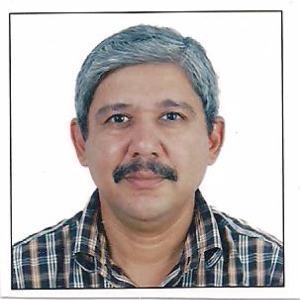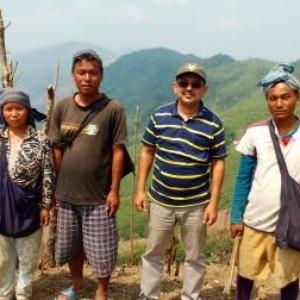Please find below the
Finalist Evaluation
Judges'' ratings
| • | Novelty: | |
| • | Feasibility: | |
| • | Impact: | |
| • | Presentation: |
Judges'' comments
This is an excellent proposal for a very worthwhile project. It demonstrates good thinking about addressing potential barriers through a revolving loan fund and other mechanisms. It is forward-thinking with high potential for long-term sustainability, however, success will depend in large part on farmer acceptance of the ideas. Additionally, if a replication and scaling up strategy (i.e. strategy for policy change, green finance, and market shift) is added then the project will be very useful. This project seems like a good candidate to invite academic researchers to follow the progress of the project and develop a report on the outcomes and replicability of the project.
Semi-Finalist Evaluation
 Olawale Olaniyan Oct 21, 2017 09:40 | Congrats! I hope you will be able to refine your ideas a little further in order to strengthen it for the finalist. Best wishes, Olawale |
 David Gandhi Nov 2, 2017 01:45 | Proposal creator Summary of Edits to the Proposal for the Final Round 1. The List of Contributors has been strengthened by including two other important stakeholders: - The Village Development Committee of Aben which will be responsible for overseeing implementation of the Demonstration Plot and the Farmer Field School as well; maintaining the Revolving Fund; value addition and market linkages; coordination with the District Administration of Tamenglong district and driving the scaling-up within Aben and the other project villages. The VDC is represented by it's member Secretary Mr. Ditung Kuame, himself a development worker, shifting cultivator and SALT enthusiast. - The Development wing of the Rongmei Naga Baptist Association an umbrella organisation of NGOs from across Manipur and Nagaland states of the NE region of India. RNBA will take on the responsibility for promoting the project model across the north-eastern region. RNBA is represented by it's Development Secretary Mr. Dimgonglung Rongmei. 2. Current Status of the Project: The period from project submission upto now covered the monsoon season which is the main cropping season in the region. The pilot project for developing the model has made very good progress. Contour barriers (using available biomass and also some hedgerows) were established on 100% of the area; seasonal crops such as paddy, chilly and vegetables were cultivated, medium term horticulture crops including banana and papaya have been planted and long term tree crops including areca-nut, parkia, citrus and litchi planted.The goatery and fish pond have been established. The land is being fertilized with clippings of nitrogen-fixing plants from the hedgerows and goat manure and being readied for plantation of winter vegetables. 3. Replication of the adaptation Model: The monsoon crop was by and large a failure with only 50 % of normal production achieved from the shifting cultivation fields. The FFS visits have encouraged cultivators to try out the new SALT model and around 20 have already signed up. Mr. Arun Nagpal of stakeholder / contributor Mrida visited Aben in October 2017 and after discussions with the VDC has agreed to help establish a revolving fund to extend part-finance to farmers implementing the model in the 2018 season. 4. Production of Organic Turmeric: Around 35 farmers from Aben are engaged in small-scale production of organic turmeric of a traditional variety. Keeping in mind the importance of resource conservation, the turmeric has been cultivated in-between contour barriers. The turmeric will be partially processed (boiling, slicing and drying) at village level and Mrida will procure the turmeric directly from the farmers at a better price. Mrida will undertake further value addition and marketing through it's existing channels. It is expected to scale-up this venture as part of the SALT adaptation model in 2018. 5. Linkages with the District Government: The stakeholders are in touch with the newly appointed Deputy Commissioner of Tamenglong district Mr. Armstrong Pame (IAS), who is himself a committed, progressive and development minded senior level official hailing from the same area. Mr. Armstrong has assured the stakeholders of the full support of the district government for the holistic development plan being prepared by the Aben VDC. |
 David Gandhi Nov 3, 2017 11:38 | Proposal creator Dear Mr. Olawale, We are indeed very happy with the review and enthused to know that we are on the right track.I was hoping to refine the proposal with updates and photos, however since returning to the project area in August, I have been off the grid, with my solar-powered smart phone as my sole means of communication.I would like to address the query raised earlier regarding testing the suitability of the SALT model to the area. The current pilot project had been designed after studying the local conditions and previous experience as well as development activities in the region.An attempt to develop an alternative was made under a donor funded project 20 years ago, wherein finance was provided for establishing hedgerows and orange groves. The farmers were able to harvest oranges for a few years after which the entire population of orange trees begin to dry up. By 2016 there was no sign that the project had ever existed except for a few nitrogen fixing trees. The farmers had either abandoned the sites or gone back to shifting cultivation.I guided the VDC and farmers through an analysis of the project and reasons for it not bringing about sustainable change. The lessons learnt are as follows: - The project was designed as an income generation activity and the farmers were not convinced about the effectiveness of the hedgerows and did not maintain them. - The monoculture approach did not promote biodiversity, conservation and risk management. - The livestock component was missing. As a result soil fertility was not maintained and the orange trees became vulnerable to disease and citrus dieback. - The entire exercise was undertaken at a fast pace with free inputs to the farmers. Sufficient time for the concept to take root was not available. The SALT adaptation model we are testing has been designed keeping in mind these 'lessons learned'. We are therefore confident that mistakes of the past will not be repeated. David |
 David Gandhi Jan 12, 2018 01:21 | Proposal creator The Author and Contributors would like to thank the Judges for advancing the proposal to the final round and for providing valuable suggestions to maximize the long-term impacts. Scalability: As pointed out by the Judges, success of the project will indeed depend in large part on farmer acceptance of the ideas. In this, we are helped by the fact that farmers are now eager for alternatives and already around 40 farmers from Aben have expressed a desire to implement the new model during the 2018 season and inquiries have come in from neighboring villages too. We had an encouraging meeting with the Deputy Commissioner of Tamenglong district Mr. Armstrong Pame, who was very impressed by our presentation on the SALT adaptation model. Mr. Pame is keen to scale up the model to the other villages in the district and has linked us up with the Department of Agriculture. We hope to have a constructive cooperation with the Government Departments to mainstream successful approaches in the coming years. We should be in a position to plan to plan out a scalability roadmap during 2018. Sustainability: The VDC has been playing an increasingly active role and the team is focusing on leadership development, so that the initiative in Aben becomes self-sustaining – from a financial as well as from an operational/implementation perspective. Market Linkages: Market linkages for turmeric have already been established, while similar linkages for millet, Indian gooseberry (amla) and a few other organically cultivated crops are being actively explored. Road infrastructure is expected to improve in the near future which will enable farmers to transport their produce to market places. The project plans to help farmers and farmer groups use mobile phones and apps to link with markets for information on prices, demand and supply; payments using apps etc. Policy Change: There is a new program in the pipeline, “Climate Change Adaptation Himalaya Program – Community-based Sustainable Forest Management for Water Resources Conservation in Manipur” to be implemented under the leadership of the Manipur Forest Department with financial support from KfW, Germany. Since most of the lands within the hill region classified as community forest are under shifting cultivation, the alternative SALT adaptation model will offer the proposed project with a viable approach to implement as part of project strategy. This has the potential to influence policy at state and regional level. Research Linkages: Inviting researchers to study and document progress of the project is an excellent suggestion. The team has been considering the possibility of inviting graduate and post-graduate students to visit the project and tying up with academic institutions to include the project area as an option for field placements. The suggestion of the Judges fits in well with our plans.
|
